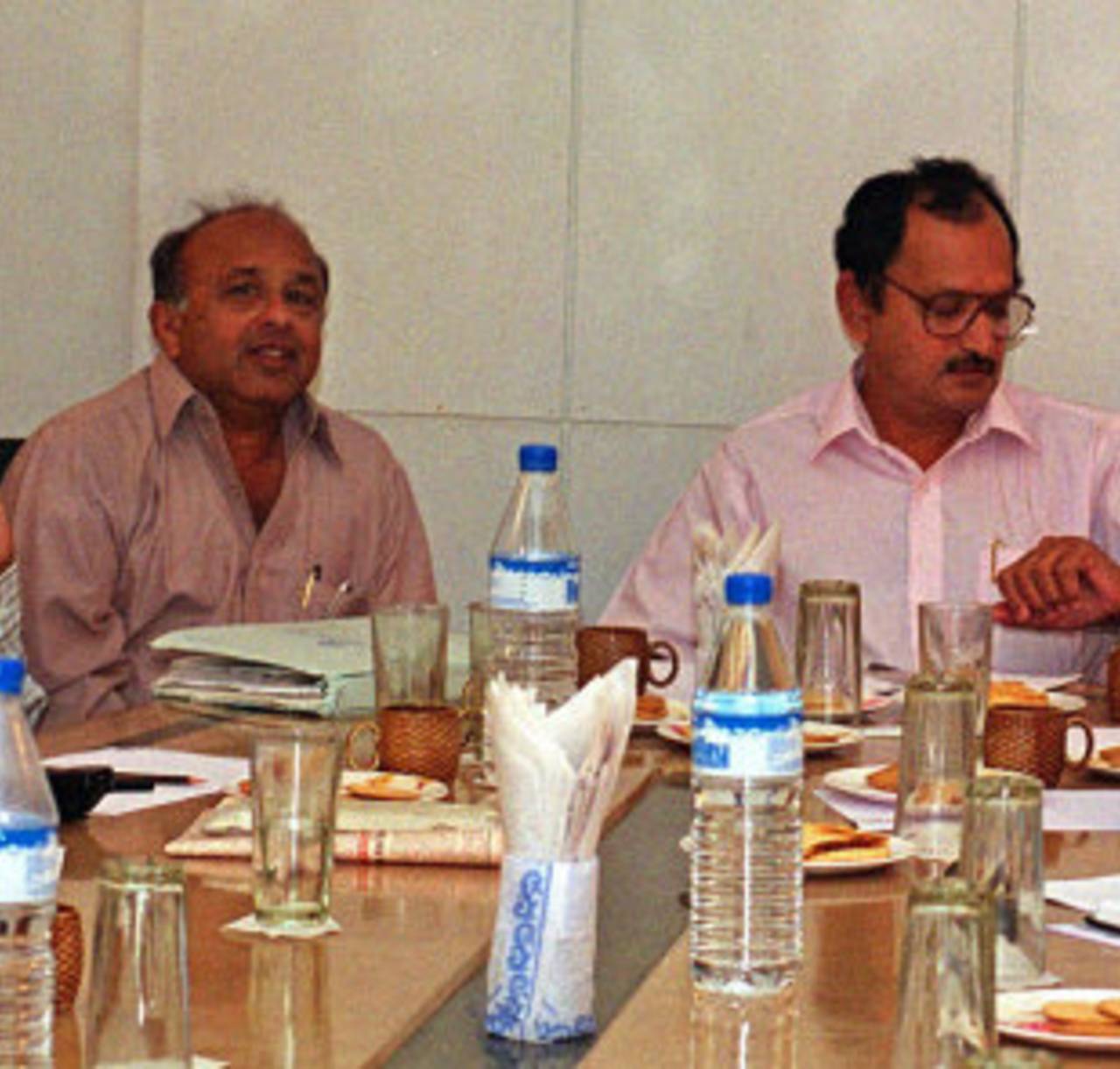No fence-sitting, no editing
Jaywant Lele's book about his life and times at the BCCI has some telling anecdotes. Too bad it's so poorly written
Dileep Premachandran
08-Jan-2012

Lele (left) saw Indian cricket administration transform from a profession for enthusiasts to one that attracted money-makers • AFP
Not many remember Jaywant Lele now, even if journalists are likely to bring up his infamous "prediction" before India's 1999-00 tour of Australia, as the team's current odyssey goes from bad to absolutely wretched. According to the man who wore many board hats, including secretary, his remark that Sachin Tendulkar's side would lose 3-0 was part of a private conversation, overheard by a journalist who decided to make something more of it. It didn't help that India did lose 3-0.
I Was There - Memoirs of a Cricket Administrator contains quite a few interesting anecdotes but is written with blatant disregard for facts, grammar or style. It says it was "scripted" by Avinash Captan, a close friend, and even a cursory reading is enough to assure you that a decent copy editor has been nowhere near the manuscript.
Such major quibbles aside, it's an interesting document from the era before Indian cricket became first among equals.
When Lele joined the Baroda Cricket Association, becoming its honorary secretary in 1969, he was an engineer with Sarabhai Chemicals. The association depended largely on the Maharaja's largesse to stay solvent. Administration back then was something for the ardent enthusiast - Lele was a qualified umpire as well - and not the opportunity to skim off vast amounts of money and misappropriate private jets that it became later. One thing the book does do well is document how the financial landscape changed, how an impoverished board figured out that it was sitting on the sporting equivalent of a gushing oil well.
There is a telling anecdote from the days when Lele was the board secretary, soon after Jagmohan Dalmiya had taken over as ICC president. Lele received a call from David Richards, then the chief executive, asking the BCCI to remit $15,000. There was "no money to pay salaries". Contrast that with now, when you have a Test championship canned because it was feared that the ICC would have to take a $50 million hit.
When it goes beyond mutual backslapping and whitewash jobs, there are a few interesting snippets. One concerns Tendulkar and a request to include Mumbai's Nilesh Kulkarni in the Test squad. Kishan Rungta, the chairman of selectors then, turned it down with a simple: "Have you seen him bowl?"
With fact-checking and better editing, this could have been a half-decent book. Instead, every few pages, you have to cope with schoolboy errors. Rahul Dravid and VVS Laxman didn't add 300-plus runs on the third day at Eden Gardens in 2001. They did on day four. Jayadevan, not Jayaraman, proposed the alternative to the Duckworth-Lewis method. When Nayan Mongia played the impetuous pull that conceivably cost India the Chennai Test against Pakistan in 1999, they were chasing 271, not 212.
Such lack of rigour aside, Lele's defence of Mongia is pretty lame, choosing to disregard the opinions of team-mates who played with him in that era.
The most interesting story of all concerns a tournament in Sharjah in the 1980s, when team members and official were reportedly promised a Toyota car each by Dawood Ibrahim if India won. They didn't, but after the Mumbai blasts a few years later, a "trembling" Lele was questioned about the meeting with Dawood.
Sadly, Lele largely glosses over the most important event of his time as board secretary - the match-fixing scandal. "We didn't really think it was possible" is the gist of his argument, and it's hard to believe, especially when he talks elsewhere in the book of the shenanigans that used to take place at selection meetings.
"A few names stood no chance of selection, while another couple had lesser chances," he writes of a time when a journalist gave him a piece of paper with the predicted squad on it. The names happened to match those selected the following day. "Even today, I'm unable to say for sure if it was a case of manipulation by someone in the committee or a case of team-fixing or a coincidence!" Lele says. Readers are unlikely to be as naïve.
During his time as an administrator, Lele could be relied on for the colourful quote, whether based on fact or otherwise, and that is evident in his assessment of the coaches that India have had since the late 1990s. "Whether it is Kirsten, Chappell or Aunshuman Gaekwad hardly makes a difference!" he says. "After playing 100 Test matches and 300 one-dayers, does [sic] Rahul Dravid and Tendulkar need a 'coach' to improve their performance?" If you go by Tendulkar's effusive praise for Kirsten and the thousands of thrown-downs he gave him over three years, the answer is clearly yes.
But whether it's saying that Gaekwad was a better coach than John Wright, or suggesting that the latter was too soft for his own good, at least Lele doesn't sit on any fences. That's the only saving grace in a flawed book that reads like a collection of schoolboy compositions.
I Was There: Memoirs of a Cricket Administrator
Jaywant Lele
Marine Sports
Rs 295

Jaywant Lele
Marine Sports
Rs 295
Dileep Premachandran is the editor of Wisden India